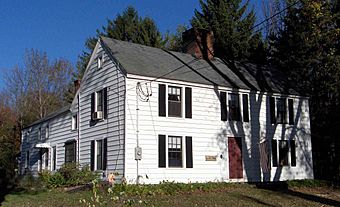Torringford Street Historic District facts for kids
Quick facts for kids |
|
|
Torringford Street Historic District
|
|
 |
|
| Location | Torringford St. from Main St. N to W. Hill Rd., Torrington, Connecticut |
|---|---|
| Area | 650 acres (260 ha) |
| Built | 1732 |
| Architectural style | Colonial Revival, Colonial, Federal |
| NRHP reference No. | 91000991 |
| Added to NRHP | July 31, 1991 |
The Torringford Street Historic District is a special area in Torrington, Connecticut, where many old and important buildings are protected. It's like a living museum! This district is on the eastern side of Torrington, along Torringford Street (also known as Route 183). This street is one of the oldest roads in Torrington. The district is famous for having many well-preserved buildings from the 1700s all the way up to the mid-1900s. It was added to the National Register of Historic Places in 1991, which means it's recognized as a very important historical place in the United States.
What is the Torringford Street Historic District?
This historic district covers about 650 acres (263 hectares). It stretches along Torringford Street from US 202 to West Hill Road. Almost all the buildings in the district face Torringford Street. There is one special property on Hayden Hill Road that also adds to the area's historic look.
The road itself, Torringford Street, follows the same path it did way back in 1732. The district includes 119 buildings that are important to history. Most of these are simple wooden houses. One very old and famous building is the Shubael Griswold Tavern, built around 1757. It was one of the first taverns, or inns, in the community.
A Glimpse into Torrington's Past
The land that became Torrington was first settled in the 1730s. It officially became a town in 1740. The path for Torringford Street was planned out in 1732.
The people living in this area mostly worked in farming. Because it was a bit far from the main town center, Torringford developed its own unique feel. In 1763, the people of Torringford were allowed to build their own church. It was finished in 1768, but it's not there anymore. Its original spot near West Pearl Street is marked today.
How Torringford Changed Over Time
In the mid-1800s, the Torringford area had some small shops and businesses. But things changed when the railroad arrived in Torrington in 1849. The railroad brought more business and growth to the main town center. This meant that Torringford became less important for trade and business.
Since then, the area has mostly remained a farming community. Some new houses have been built over the years, but it still keeps its historic, rural charm.
 | Percy Lavon Julian |
 | Katherine Johnson |
 | George Washington Carver |
 | Annie Easley |



